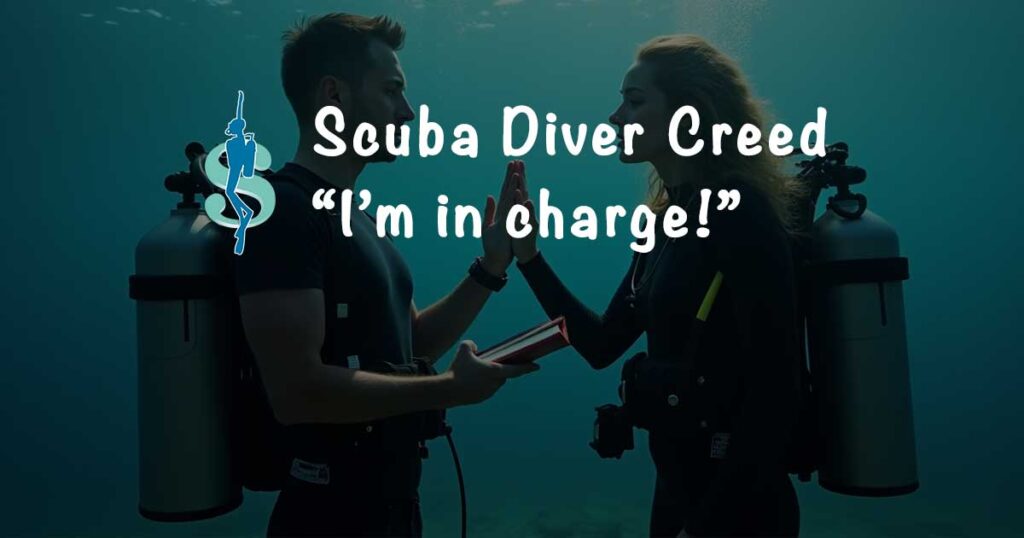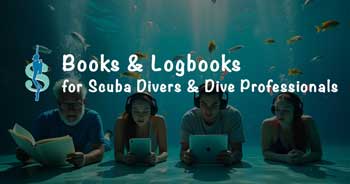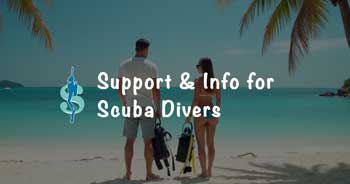Scuba Diver Creed
I’m in Charge of My Own Safety & Pleasure
The quality of training in the open water certification course is highly questionable. And instructors readily admit to cutting corners. So, you are in charge of your own safety and pleasure underwater.
Your open water scuba certification qualifies you (in theory) to dive in conditions similar to those in which you were trained. But those conditions are not written on your c-card. So, once again, you are in charge of your safety and pleasure.
I prepared the following Scuba Diver Creed as a reminder of our responsibilities as we venture into the underwater world. Let’s have a lifetime of legendary underwater experiences!
This post is part of Are You (Scuba) Certifiable? series by the Business of Diving Institute and Darcy Kieran, author of:
“Commitment is an act, not a word.” ~Jean-Paul Sartre
Some statements in this “diver creed” are explained in detail in “The Ultimate Beginner’s Guide To Scuba Diving: How to increase safety, save money & have more fun!”
However, everything here should be self-explanatory and based on the SPF approach. Safety (S) comes first, no matter what. Then, you need performance (P) which is a catch-all for mastering your skills and having the right equipment, knowledge, and attitude. All of that must be covered for you to be comfortable underwater and have fun (F) in memorable underwater experiences!
As a scuba diver:
- I am committed to safety first.
- I am committed to constantly improving my skills and knowledge to support safety and fun.
- I dive within the limits of my training and experience.
- I consider my mental and physical fitness when selecting dive sites and buddies.
- I am committed to only diving when I am in the right frame of mind.
- I avoid diving when under the influence of alcohol/drugs, lacking sleep, or dehydrated.
- I plan each dive with my dive buddy, including goals, hand signals, and positioning.
- I carefully listen to dive briefings and ask questions if anything is unclear.
- Before each dive, I review the procedures to follow if I am separated from my buddy.
- I am familiar with the dive sites I use or seek an orientation from a knowledgeable, experienced local source.
- I inquire about and respect local laws and regulations.
- I respect other divers’ right to cancel a dive anytime and for any reason.
- I cancel a dive if the weather or other conditions are worse than those in which I am experienced.
- I do not pressure other divers into doing things they are not comfortable with or trained for.
- For my own safety and to protect the environment, I pay special attention to weighting, buoyancy control, streamlining, and trim.
- I select dive operators on safety before price.
- I recognize that dive professionals need to be adequately remunerated to provide consistency in the safety and quality of my dives.
- I follow strict environmental standards, including not touching the reef, not harassing marine life, and using reef-safe products.
- I seek further knowledge on marine environments to limit my impact.
- I prioritize dive professionals and organizations committed to being environmentally and socially responsible.
- I only use well-maintained, reliable, and well-performing dive gear with which I am familiar.
- To dive with an unfamiliar piece of gear, I first practice in confined water or in an easy dive site.
- I stay away from fill stations unless I have received formal training as a fill station operator.
- I dive with a dive computer.
- I stay within close proximity to a dive flag or the dive boat.
- I do not dive in overhead environments (caves, wrecks) unless I have received specialized training.
- I debrief each dive with my dive buddy (or self-debrief) to identify areas of improvement.
- I learn from my mistakes and those of others without judging.
And remember, there are three speeds in scuba diving: slow, slower, and slowest. If you can go slower, you are going too fast.
For you, if you are a dive professional, I’ve also prepared a Divemaster & Scuba Instructor Creed.
On a related note: Phase One of Project ASK4Q is a pledge by scuba divers and dive professionals (scuba instructors, divemasters, and dive center owners & staff) to systematically seek appropriate attitudes, skills, and knowledge (A.S.K.) for a quality (Q) experience based on continuous improvement in safety, performance, and fun (S.P.F.). This creed is a first draft of what a formal pledge could look like.
I’d love to hear your feedback on this first draft of a Scuba Diver Creed. Contact me, please.
Keep reading about your scuba diving certification and open water skills in “Are You (Scuba) Certifiable?“
If the information in this post was valuable to you, would you consider buying me a coffee?
Either way, I wish you a lifetime of legendary underwater adventures!
You may also be interested in The Immersion Zone (our podcast) and Scuba Diver Press (our newsletter for scuba divers).





